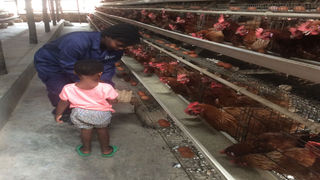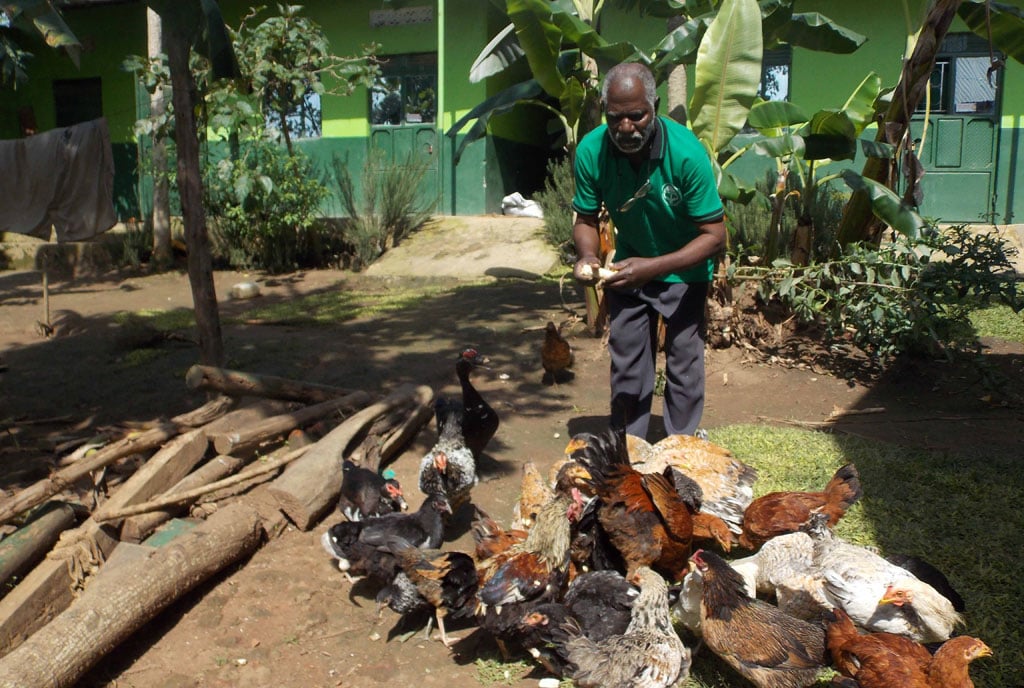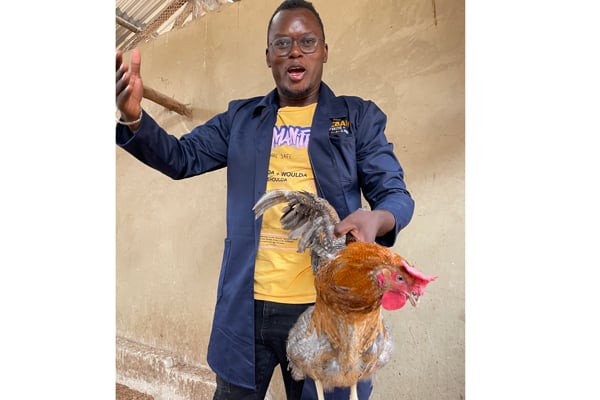
Violet Kukundakwe picks eggs with her daughter. PHOTO / Joan Salmon
|Prosper
Prime
From radiography to rearing poultry
What you need to know:
- Violet Kukundakwe stepped away from her radiography job to rear chicken.
- She has stood through the highs and lows to see the enterprise grow into a solid and sustainable business.
Violet Kukundakwe, a radiographer, speaks casually about life and the decisions she has taken.
For once, I feel comfortable to get more personal but also ask important questions.
Kukundakwe is a radiographer and holds a post graduate diploma from the University of Johannesburg in the same. However, she has found a way out of her professional life and now finds joy and satisfaction in farming.
“The salary was not matching what I had invested. So, I tried out my childhood passion - farming. I decided to try another world because I believed I would have more impact on myself and others by creating jobs,” she says.
Kukundakwe, is the proprietor of Kesting Farm Enterprises. She is a mother, wife and has also tried teaching on a volunteer basis.
In 2013, she started on a long farming journey that would eventually birth Kesting Farm Enterprises, a holding business for he poultry business.
“My first batch had 250 birds. I did not know much about poultry. I was the sole caretaker, so, when I would be away, no one would cater for their well-being. Consequently, many died and I suffered a 60 percent loss,” she says.
This was a rude way of ushering her into the world that she had believed would give her the freedom away from employment.
“I had initially thought poultry was a walk in the park. With these losses, I learnt a lot but dared to go into full-time farming,” she says.
The investment, from purchasing the birds, buying feeds, feeders and drinking cans to raising them until they started laying had cost her about Shs5m.
Kukundakwe was not convinced that she had failed with poultry. Therefore, she tried again, relocating from Namugongo, her mother’s place, to Maganjo in February 2014, this time with an investment of more than 1,000 birds.
“This was also family land that housed a struggling school. I was given two rooms - one to raise the chicken and the other for accommodation,” she say.
Eventually, the farm picked up, which meant that it needed more space. The school was closed and more structures were created for the poultry business.
Today, Kesting is synonymous with yellow york eggs, organic manure and off layers but has also has a channel of other business - making hair oil from eggs and sugarcane juice.
The poultry businesses has grown to do its own brooding – where birds are reared from when they are a day old - to production houses, where they are kept for at least two years, before they are sold off as off layers.

Violet Kukundakwe displays juice made from sugarcane. Kesting also makes sugarcane juice - Kikajjo Juice.
The business has also been a learning experience for Kukundakwe.
In the beginning, the farm employed the deep litre system, which was labour intensive, but has now changed to the cage system, which is easier when it comes to egg collection.
Kukundakwe has been doing poultry for the last nine years and is on her 12th batch.
Looking back, she is not the farmer she was in 2013 and the losses have been eliminated.
“I have mastered the management [part] to the point that I teach other farmers how to manage their poultry farms. For instance, I know that biosecurity, and hygiene are a must. I also know where to get quality and affordable feeds [to balance the] profit margins and the like. So, I cannot make the same mistakes,” she says.
Growing up
Kukundakwe grew up in a homestead that she says taught her that hard work was the only way to survival.
Therefore, she says, that is how she has managed to drive her poultry business.
“It is hard work - real hard work. My medical background has also been handy. I understand what the vet is saying and doing and the reason why. Consequently, I am now more about prevention than cure,” she says.
Prevention, she says, is a crucial part of poultry because it is usually difficult, if not impossible, to treat birds once they get sick.
But beyond this, she has also picked ideas from different groups at a very low cost or no pay at all.
“I have also had book keeping and financial management trainings, which have helped to ensure that the money is used productively,” she says and she has had productive sessions of networking. When Covid-19 struck, it was a hard experience for Kesting. However, it is through the hardship that Kukundakwe picked the other business ideas that birthed the making of hair oil from eggs, sugarcane juice and manure.
The manure is seasonal but the hair oil - which carries the Ekiviri brand name - has become a part of Kesting.
The product, which is packaged in 100 millilitre bottles, is still work in progress even as a number of sales have been recorded.
Kesting also makes sugarcane juice - Kikajjo Juice – which is packed in three and five litre Jerricans.
Costs and expenses
When it comes to expenses, the business has a number of activities on which money is spent such as veterinary services, feeds, vaccines, flushing agents, wages and salaries, electricity and water bills, among others.
At least this, Kukundakwe says, takes on average Shs7m per month but this largely depends on the number of birds under care in any particular month.
Managing expenses is structured through a systems-based setup that allows the business function independent of any individual, including myself.
Kukundakwe has also joined a number of setups that support systems building.
“We have transitioned from being a sole enterprise to a company. The training has also enabled me to share the vision with my employees,” she says.





